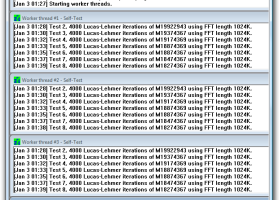 Prime95 is the name of the Microsoft Windows-based software application written by George Woltman that is used by GIMPS, a distributed computing project dedicated to finding new Mersenne prime numbers. As of September 2009, 13 new Mersenne prime numbers have been found by the network of participants, and, on average, a new Mersenne prime is discovered approximately every year.
Prime95 is the name of the Microsoft Windows-based software application written by George Woltman that is used by GIMPS, a distributed computing project dedicated to finding new Mersenne prime numbers. As of September 2009, 13 new Mersenne prime numbers have been found by the network of participants, and, on average, a new Mersenne prime is discovered approximately every year.
Over the years, Prime95 has become extremely popular among PC enthusiasts and overclockers as a stability testing utility. It includes a "Torture Test" mode designed specifically for testing PC subsystems for errors in order to help ensure the correct operation of Prime95 on that system. This is important because each iteration of the Lucas-Lehmer depends on the previous one; if one iteration is incorrect, so will be the entire primality test. The stress-test feature in Prime95 can be configured to better test various components of the computer by changing the fast fourier transform (FFT) size. Three pre-set configurations are available: Small FFTs and In-place FFTs, and Blend. Small and In-place modes primarily test the FPU and the caches of the CPU, whereas the Blend mode tests everything, including the memory. On an absolutely stable system, Prime95 would run indefinitely. If an error occurs, at which point the stress test would terminate, this would indicate that the system may be unstable. There is an ongoing debate about terms "stable" and "Prime-stable", as Prime95 often fails before the system becomes unstable or crashes in any other application. This is because Prime95 is designed to subject the CPU to an incredibly intense workload, and to halt when it encounters even one minor error, whereas most normal applications do not stress the CPU anywhere near as much, and will continue to operate unless they encounter a fatal error.
On an absolutely stable system, Prime95 would run indefinitely. If an error occurs, at which point the stress test would terminate, this would indicate that the system may be unstable. There is an ongoing debate about terms "stable" and "Prime-stable", as Prime95 often fails before the system becomes unstable or crashes in any other application. This is because Prime95 is designed to subject the CPU to an incredibly intense workload, and to halt when it encounters even one minor error, whereas most normal applications do not stress the CPU anywhere near as much, and will continue to operate unless they encounter a fatal error.
Lastly, power supply units of any machine running Prime95 are subject to the consistent ramifications of such harsh conditions. Power must be maintained clean, while providing adequate voltage, particularly to the CPU, RAM, and chipsets (mainboard chipsets such as the Northbridge where the memory controller may or may not reside; see Athlon 64 or Intel Core i7 for on-die memory controllers) to provide peak performance while maintaining stability.
Download : Win 32-bit | Win 64-bit
Superb blog post, I have book marked this internet site so ideally I’ll see much more on this subject in the foreseeable future!
ReplyDelete